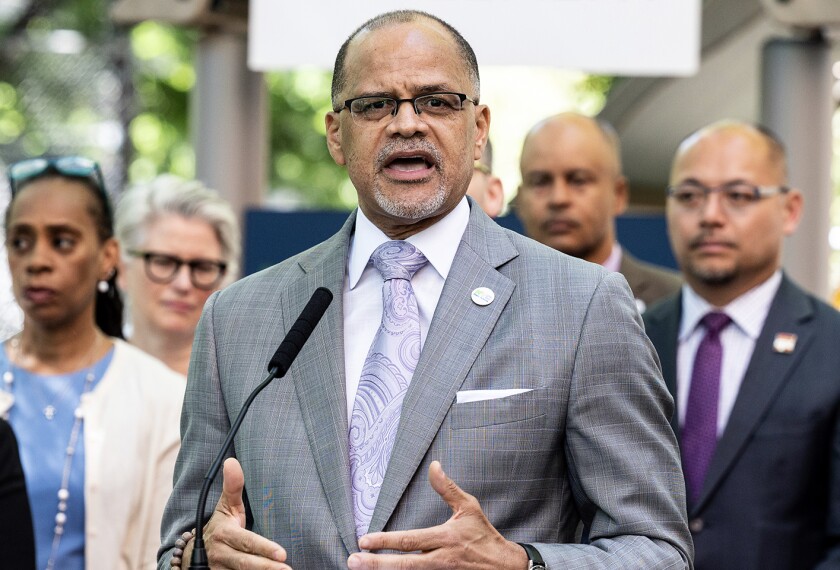Federal Communications Commission Chairman Ajit Pai announced Monday that he will be stepping down from his role at the end of President Donald Trump’s term on Jan. 20, 2021. Education advocates are not sorry to see him go.
The FCC oversees the E-rate program, which helps schools and libraries obtain affordable broadband. And it is more important than ever, now that thousands of schools across the country are operating partially or fully remote to avoid spreading the coronavirus.
Education advocates have been clamoring for additional support for the E-Rate, including to help school districts expand broadband access for teachers and students who might not have a stable connection—or any connection—at home. But Pai, a Republican who was elevated to the helm of the commission by Trump, hasn’t taken steps to make that happen, even in the midst of unprecedented need.
“There’s never been a moment where connectivity has been so important in our country. It was the prime moment that was designed for the FCC to step up and it didn’t happen,” said Richard Culatta, the chief executive officer of the International Society for Technology in Education. “I’m not really sure what his vision was, what he was trying to do, but it didn’t feel like it was helping education and I’m not sure it was helping families.”
Keith Krueger, the CEO of the Consortium for School Networking, or CoSN, a nonprofit organization serving education technology leaders, sounded a similar note.
“The FCC has an incredibly important role right now given the fact that families all across America need to be connected for school and for continuous learning. Frankly, under Chairman Pai’s leadership the FCC has been pretty slow to act,” Krueger said.
Still, Krueger said, it “could have been worse.”
When Trump took office, CoSN worried that his administration would move to scrap the E-rate program altogether. But Pai was upbeat about the program’s impact, according to Krueger. Still, he said while the chairman “had a lot of good rhetoric, [he] didn’t’ do anything to ensure the things that we really needed.” That included expanding the Lifeline Program, which is paid for out of the same larger fund as the E-Rate and helps provide broadband access to low-income families. “The Lifeline program could have been ready for kids” when they needed it during the pandemic, Krueger said.
What’s more, Pai supported steps that would have been damaging to the E-Rate program, including putting a cap on the overall universal fund, which covers the cost of the program.
That could have limited the amount of money the E-Rate receives. And it would have made the program compete for broadband funding with rural healthcare, rural communities and farms, and home internet access for those in poverty.
And in 2018, Pai also led the effort to roll back net neutrality rules put in place during the Obama administration that would have allowed the FCC to step in when service providers unfairly blocked or throttled the flow of content over the internet based on Internet users’ ability to pay for services. Education advocates worried the move would open the door to slower connectivity and higher prices for schools and libraries, especially in poorer communities.
For his part, Pai, who was initially appointed as a commissioner under President Barack Obama with the support of Senate Republicans, said in a statement that he and his colleagues have worked to “execute a strong and broad agenda. Together, we’ve delivered for the American people over the past four years: closing the digital divide; promoting innovation and competition, from 5G on the ground to broadband from space; protecting consumers; and advancing public safety.”
President-elect Joe Biden will get to name Pai’s replacement as chairman. Democrats will hold a majoriy on the commission. And education advocates are hoping that person will be in their corner.
CoSN would like to see the FCC expand home access for students and teachers, allow E-Rate funding to be used for cybersecurity, and create much better maps of where broadband access is available so that policy makers can better target federal resources to help connect teachers and students. Those maps need to show schools, libraries, and hospitals, Krueger said.
Culatta added: “I’m really hopeful for the future, there’s still time and there’s still need, there’s a lot of energy in the education community to get this right.”






